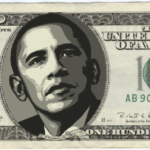The Obama administration on Monday unveiled its plans for a fresh assault on international tax cheats that officials say will help reduce the Federal budget deficit from a record $1.5 Trillion this year. President Obama also announced the Fiscal Year 2011 Budget will include budget cuts of $250 Bn over ten years, and will make critical investments in job creation and continued economic recovery, while bringing a new level of responsibility to how tax dollars are spent.
As part of the plan, US-based multinational corporations that transfer brands and patents to subsidiaries or affiliates in foreign countries in order to aviod US taxes overseas, would pay a surcharge on the excess returns on those assets under new IRS guidelines being proposed. The administration also proposes denying companies that borrow money to invest overseas the ability to take immediate tax deductions on the interest payments. In a time of economic hardship in all quarters of the nation, the Obama administration is seeking to end what amounts to taxpayer subsidies, or corporate welfare, and to ensure that even corporations bear their fair share by ending tax give-aways to corporations – especially to those who seek loop-holes to avoid paying taxes on their revenues and operations. Although the budget is high by historical standards, most objective economists agree that given constraints on lending and capital investments in the private sector; and an increasingly pinched consumer sector wrought with high unemployment levels and tight household budgets, the only option left in the Keynesian Economic equation [C+I+G+Ex-Im=GDP] is for government to increase spending in order to stimulate growth in the other two sectors. Future growth, according to this analysis, will help eliminate the present growth in deficit spending.
 The announcements came as part of President Barack Obama’s budget plan, which would see another $100bn jobs programme this year followed by the beginnings of deficit reduction from 2011 onwards. “We won’t be able to bring down this deficit overnight, given that the recovery is still taking hold and families across the country need help,” Mr Obama said on Monday. But he said his administration was committed to “putting our country on a more fiscally sustainable path”. The president warned: “We simply cannot continue to spend as if deficits don’t have consequences.”
The announcements came as part of President Barack Obama’s budget plan, which would see another $100bn jobs programme this year followed by the beginnings of deficit reduction from 2011 onwards. “We won’t be able to bring down this deficit overnight, given that the recovery is still taking hold and families across the country need help,” Mr Obama said on Monday. But he said his administration was committed to “putting our country on a more fiscally sustainable path”. The president warned: “We simply cannot continue to spend as if deficits don’t have consequences.”
Under the president’s budget, although the budget represents a 5% real increase versus last year, the deficit would actually decline from 10.6% of GDP in fiscal 2010 to 3.9% by 2015, placing it in reasonable levels according to some credit ratings analysts.
According to a Financial Times article, Bill Galston, a fellow at Brookings, said that while the budget “incorporates some modest steps towards fiscal restraint” – such as a freeze on non-security discretionary spending – “its bottom line numbers dramatize the unsustainability of our current course”.
Mr Obama challenged Republicans to join Democrats in developing plans for further fiscal consolidation through a bipartisan commission – but received little encouragement from the Republican leadership. Administration officials say the crackdown on international tax cheating by companies and individuals would raise $122 Bn in revenues over the next 10 years. Also, In a swipe at the huge oil companies who benefited from generous tax subsidies under the previous administration, the Obama administration made another request to end subsidies for oil and gas companies, saying it would help fight global warming, as well as save $36.5 Bn over 10 years. ”We will not continue costly tax cuts for oil companies,” Mr Obama said. The White House also renewed its push to limit the rate at which top bracket taxpayers can make itemised tax deductions… Read more on this topic here.
Source: FT.com, Video: www.WhiteHouse.gov